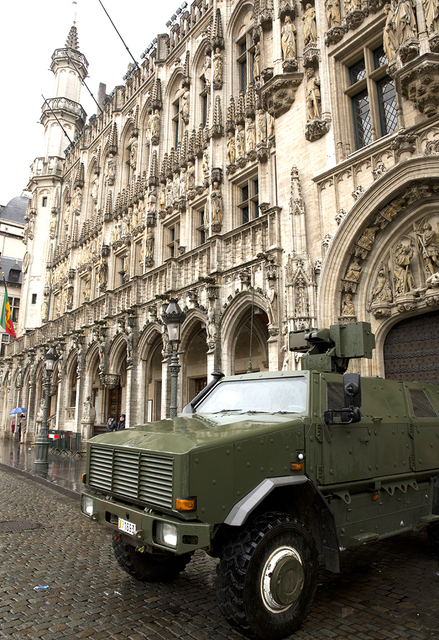BRUSSELS — Belgian authorities closed down Brussels’ subway system and flooded the streets with armed police and soldiers Saturday in response to what they said was a threat of Paris-style attacks. ADVERTISING BRUSSELS — Belgian authorities closed down Brussels’ subway
BRUSSELS — Belgian authorities closed down Brussels’ subway system and flooded the streets with armed police and soldiers Saturday in response to what they said was a threat of Paris-style attacks.
The decision to raise the threat alert to the highest level in the Belgian capital came as the manhunt continued for a suspect missing since the carnage in neighboring France. It was taken “based on quite precise information about the risk of an attack like the one that happened in Paris,” said Belgium’s Prime Minister Charles Michel.
The tip authorities received suggested that an attack would involve “several individuals with arms and explosives launch actions, perhaps even in several places at the same time,” he said.
The U.S. Embassy in Belgium urged Americans in the country “to shelter in place and remain at home” while the U.S. European Command issued a 72-hour travel restriction for U.S. military personnel on travel to Brussels — a city of more than 1 million that is home to the headquarters of the European Union, the NATO alliance and offices of many multinational corporations.
On Saturday night, a relative calm descended on the city center, where restaurants and beer bars would usually be teeming with business. On Brussels’ central square, the Grand Place, tourists snapped selfies as a green army truck full of soldiers pulled up next to a lit Christmas tree. Some restaurants and bars shuttered their doors, while others remained open, defying advice from the mayor to close for the night.
Tensions were also high elsewhere in Europe. In Paris, police equipped with emergency powers extended a ban on demonstrations and other gatherings through Nov. 30, when a U.N. climate conference with more than 100 heads of state is scheduled to start.
Several of the Paris attackers had lived in Brussels, including suspected mastermind Abdelhamid Abaaoud, who was killed in a standoff with French police on Wednesday.
Salah Abdeslam, another suspected attacker, is at large and is known to have crossed into Belgium the morning after the Nov. 13 attacks. A Paris police official and the Paris prosecutor’s office said Saturday they had no firm information on Abdeslam’s whereabouts, including whether he was in the Brussels area.
Carine Couquelet, the lawyer for a man who rode back to Belgium with Abdeslam, said in a broadcast interview Saturday that her client had said Abdeslam was extremely nervous and may have been wearing a suicide bomb vest.
The Belgian Federal Prosecutor’s office said several weapons were discovered during a search of the home of one of three people arrested in connection with the Paris attacks, but that no explosives were found. It didn’t specify when the weapons were found. The three have been charged with “participation in terrorist attacks and participation in the activities of a terrorist organization.”
In the Turkish coastal city of Antalya, authorities detained a 26-year-old Belgian citizen, suspected of being connected to Islamic extremist and possibly to the Paris attacks — raising hopes of a possible new break in the investigation.
The private Dogan news agency identified him as Ahmet Dahmani and said he is suspected of having explored areas in Paris that were targeted in the attacks. A senior Turkish government official, who spoke on condition of anonymity due to Turkish government rules, said he was believed to have been in contact with the Paris attackers. Dahmani had arrived in Turkey Nov. 14 from Amsterdam, and was preparing to cross into Syria together with two other suspected Islamic State militants, the official said.
Belgium’s national Crisis Center raised its terrorism alert for the Brussels region to Level 4, which indicates a “serious and immediate threat.” Heavily armed police and soldiers on Saturday patrolled key intersections of the city.
Residents were advised to avoid gatherings, train stations, airports and commercial districts. Service was halted on the Brussels Metro, as well as on streetcar lines that run underground.



